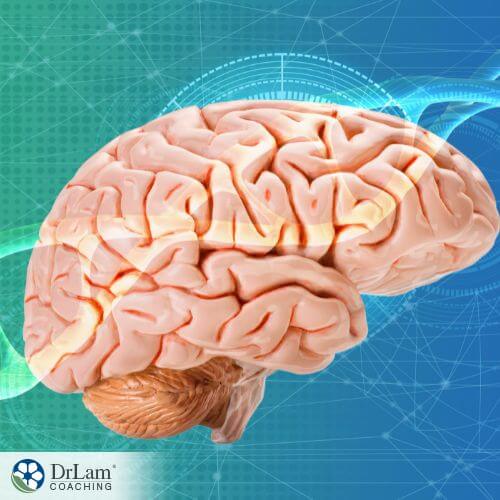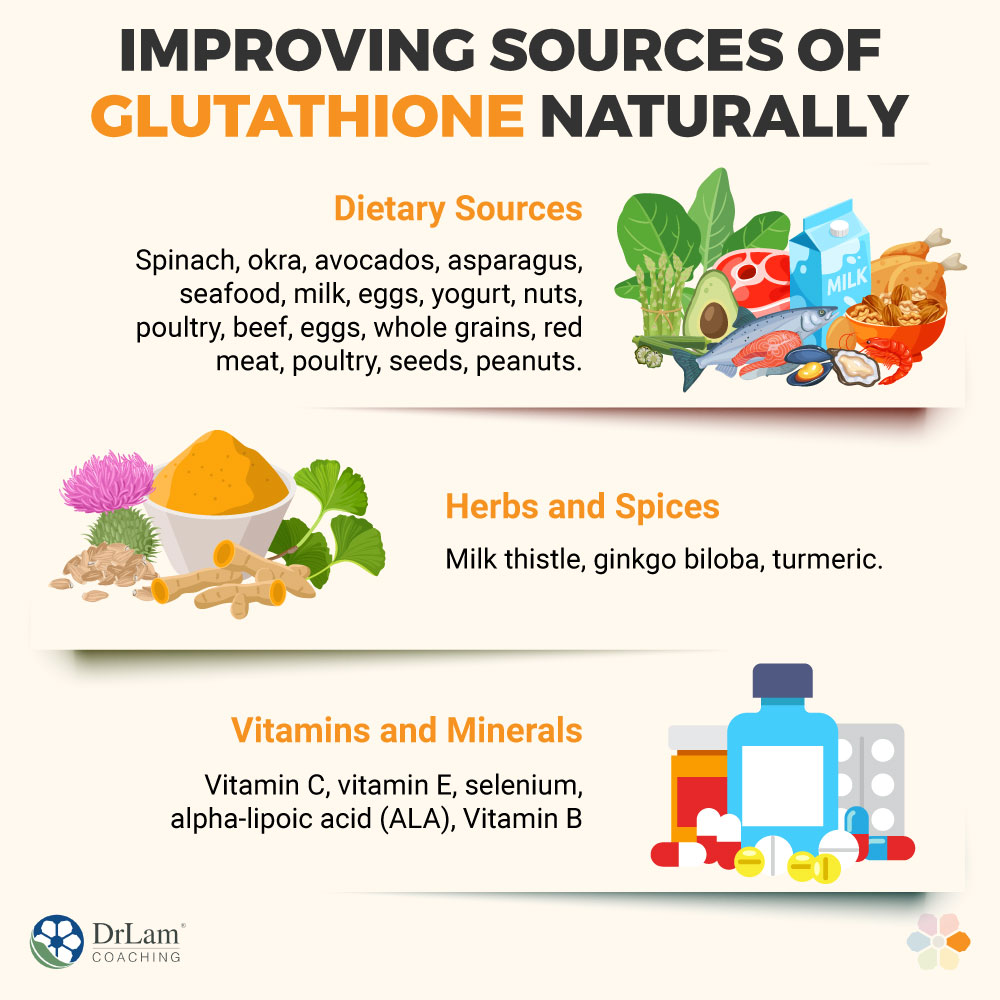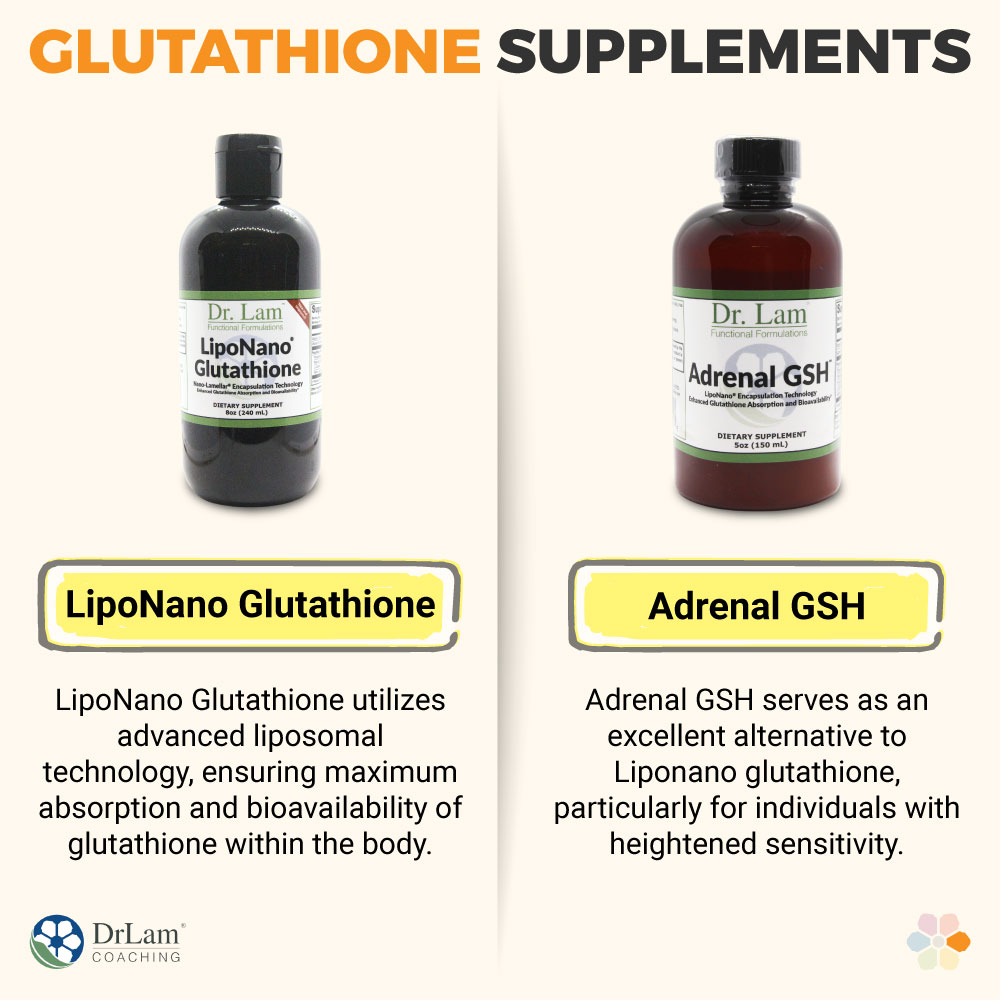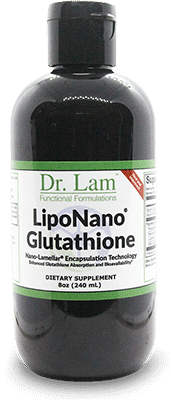 Your brain is a crucial part of your health. It plays a role in every function in your body including breathing, movement, thinking, and most essential bodily processes. Those with certain conditions like anxiety, dementia, or autism may be dealing with impaired brain health. However, new research shows that an antioxidant known as glutathione may help brain fog, reduce the damage of severe conditions like Parkinson's and Alzheimer's, improve the behavior of children with autism, and play a role in anxiety. This article considers this research and how to get it.
Your brain is a crucial part of your health. It plays a role in every function in your body including breathing, movement, thinking, and most essential bodily processes. Those with certain conditions like anxiety, dementia, or autism may be dealing with impaired brain health. However, new research shows that an antioxidant known as glutathione may help brain fog, reduce the damage of severe conditions like Parkinson's and Alzheimer's, improve the behavior of children with autism, and play a role in anxiety. This article considers this research and how to get it.
For this article, we will define brain health as the motor, behavioral, cognitive, sensory, and social-emotional functions of the brain and the absence of conditions affecting it.
There are many factors that can affect your brain health. These include:
Some of the reasons that these factors can reduce brain health are that they increase inflammation in the brain and can also cause a change in the hormone and nutrient levels in the brain (1).
Glutathione is a compound that your body naturally produces from three amino acids:
It has several key roles in the body, largely connected to its properties as a powerful antioxidant and anti-inflammatory.
Due to bodily processes, stress, or environmental toxins, your body produces free radicals. Free radicals are unstable molecules that can damage your cells, this phenomenon is also known as oxidative stress. Your brain is protected by a blood-brain barrier that can protect the brain from toxins. However, as oxidative stress increases, the permeability of this barrier increases and free radicals can cross the barrier.
Once the free radicals cross the barrier, they target the brain cells. Brain cells have a high metabolism and are rich in fatty acids, which make them vulnerable to free radicals. These free radicals damage the brain cells and can result in an increase in brain cell death.
Glutathione is a potent antioxidant and can help to neutralize the free radicals, preventing further damage to cells. Your body naturally produces glutathione, which is present throughout your body. However, it is highest in your nervous system and brain. Not only does it help to neutralize free radicals, but it also plays a role in removing peroxides - a waste product that is produced by the brain cells.
Aging is not only the presence of wrinkles but also includes the aging of cells. When glutathione levels are low, the free radicals can damage the brain cells and can lead to cell death. If this continues consistently, it can cause the brain to age and can increase the risk of conditions such as:
 Studies suggest that individuals with these conditions have lower glutathione levels, leading many to believe that sufficient glutathione levels can possibly delay the onset of these conditions (2).
Studies suggest that individuals with these conditions have lower glutathione levels, leading many to believe that sufficient glutathione levels can possibly delay the onset of these conditions (2).
Whilst low levels can result in these conditions, there is also research available on the use of glutathione in improving outcomes in these patients. More research is necessary, but there are promising results. A recent meta-analysis investigating the role of glutathione in Parkinson's disease found that whilst it did not improve mood and the ability to perform daily activities, it did slightly improve motor function compared to individuals on the placebo (3).
Another study focusing on cognition in Alzheimer's disease found that a supplemental formula containing a building block of glutathione did suggest improvements in cognition. However, more research is necessary (4).
This term describes a group of symptoms that includes confusion, forgetfulness, and lack of focus. There can be many reasons for brain fog that include lack of sleep, frequent use of electronic devices, stress, and an increase in inflammation. The increase in inflammation can be caused by many factors such as illness and an increase in toxins. This can deplete your antioxidants resulting in further inflammation.
Glutathione can improve brain fog by replenishing antioxidant levels and reducing inflammation. This antioxidant can also help to remove toxins that may be contributing to brain fog.
Studies suggest that oxidative damage can also affect the severity of anxiety in major depressive disorder. Interestingly enough, oxidative stress did not affect the severity of depression. Whilst research suggests that oxidative stress can affect the severity of anxiety, there is limited research on glutathione's effectiveness in improving anxiety symptoms (5).
There is increasing evidence that glutathione levels in autistic individuals are lower, which could be due to the increase in oxidative damage and inflammation. Glutamate is a brain hormone that excites the brain cells and helps to improve memory and learning. Whilst glutamate is important, a fine balance is needed. Glutathione helps to manage the balance of glutamate in the brain. In autistic individuals, the low levels of glutathione results in a high level of glutamate that will eventually result in damage to the brain cells. This is one of the causes of the sensory symptoms and impairment in motor function that many autistic individuals experience.
Studies researching the effect of glutathione in autistic individuals suggest that it, as well as its building blocks, can help to improve oxidative stress and inflammation as well as lead to an improvement in behavior (6,7).
Glutathione also has several additional research-based benefits.
Insulin is a hormone that's involved in regulating your glucose levels. Some individuals become less sensitive to this hormone over time and this results in higher glucose levels and can later result in diabetes.
In one study, researchers focusing on the effects of glutathione and insulin sensitivity gave individuals experiencing insulin resistance a diet rich in the amino acids cysteine and glycine. After two weeks, there was an increase in glutathione levels as well as insulin sensitivity.
Another study looked at the effect of glutathione in individuals with diabetes who had uncontrolled sugar levels. Chronic high sugar levels have been associated with low glutathione levels. In this study, after individuals were given cysteine and glycine, the results found that not only did glutathione, improve but the cellular damage that generally occurs with high sugar levels was reduced (8).
 N-acetylcysteine is the precursor to cysteine and therefore is one of the precursors to glutathione. This precursor has been used in relieving asthma, cystic fibrosis as well as Covid-19 and helps to thin the mucus in the lungs, improving respiratory health as well as improving inflammation (9).
N-acetylcysteine is the precursor to cysteine and therefore is one of the precursors to glutathione. This precursor has been used in relieving asthma, cystic fibrosis as well as Covid-19 and helps to thin the mucus in the lungs, improving respiratory health as well as improving inflammation (9).
This condition is when the arteries, specifically arteries in the legs become blocked by plaque. This not only causes pain but also reduces the circulation of blood and mobility. One study found that glutathione helps to improve circulation and increase the amount of time that these individuals were able to walk pain-free (10).
With its antioxidant activity, glutathione can not only enhance brain health but it can also reduce inflammation in other parts of the body and in chronic conditions. These chronic conditions where it has been shown to help improve outcomes by reducing inflammation include:

The body naturally produces glutathione. However, its production can be enhanced through nutrition as well as supplementation.
When looking at dietary sources of glutathione, there are several foods rich in this antioxidant, including:
Whilst these foods are rich in glutathione, your body does not absorb it well. In addition, due to cooking, preparation, and storage methods, the benefits can be lost.
Another way to increase glutathione levels is to consume foods rich in the amino acids that are involved in the production of glutathione.
Research shows that some herbs such as milk thistle, ginkgo biloba, and turmeric may help modulate glutathione levels or act as it on glutathione pathways in the body. Milk thistle is a herb native to the Mediterranean region containing the active ingredient silymarin. This active ingredient, like glutathione, is an antioxidant. Research shows it may modulate glutathione pathways and improve detoxification (11).
Ginkgo biloba is a herb that comes from a tree native to China. One study found ginkgo may help to improve detoxification and levels of glutathione enzymes.
Turmeric contains the active ingredient curcumin. Studies show curcumin may also help modulate glutathione enzymes (12).
There are a range of vitamins and minerals that can help to improve glutathione levels in your body. These include:
Whilst lifestyle changes may not be a source of glutathione, practicing certain lifestyle habits can help to preserve optimum levels.
 Practicing regular exercise can help to preserve levels of glutathione, and at least one study found that a combination of both cardio and weight training was more beneficial than doing them alone (13). The study used exercise at 120 minutes of moderate-intensity exercise per week.
Practicing regular exercise can help to preserve levels of glutathione, and at least one study found that a combination of both cardio and weight training was more beneficial than doing them alone (13). The study used exercise at 120 minutes of moderate-intensity exercise per week.
However, over exercising can have side effects if you have other health conditions like adrenal fatigue, so it is important to seek guidance from a medical professional before increasing your physical activity if you have preexisting health conditions.
Sleep is an important part of healing and letting your body recover from the day. Without adequate sleep, the free radicals in your body can increase, leading to increased cellular damage. This increases and then depletes your glutathione levels. Having adequate sleep will help to preserve your levels as well as assist your body with healing. For adults, the recommended length of sleep is at least 7 hours (14).

Whilst there are indirect ways to boost your levels of glutathione, there are also more direct ways through glutathione supplementation. However, be aware that the FDA does not approve dietary supplements, and some can be of low quality. This makes it important to use a company that has a reputation for high-quality ingredients and supplements.
Glutathione supplements are becoming increasingly popular and can be hard to choose between. Here are some glutathione supplements we most often recommend.
This is our flagship supplement. LipoNano Glutathione utilizes advanced liposomal technology, ensuring maximum absorption and bioavailability of glutathione within the body. This allows for higher concentrations of glutathione to reach targeted cells and tissues, resulting in enhanced antioxidant and detoxification effects. The liposomal technology protects glutathione from getting denatured in stomach acid. Additionally, LipoNano Glutathione is manufactured using high-quality ingredients and rigorous quality control processes, ensuring purity and potency. It is alcohol-free, unlike other brands, meaning it is healthy for the liver.
Adrenal GSH serves as an excellent alternative to LipoNano Glutathione, particularly for individuals with heightened sensitivity. This specialized formulation focuses on providing a more gentle approach while still harnessing the benefits of glutathione. Adrenal GSH is specifically designed to support adrenal health and stress management, making it ideal for those with compromised adrenal function or sensitive systems. With its carefully selected ingredients and balanced composition, Adrenal GSH ensures a milder yet effective approach to promoting antioxidant activity and detoxification. By prioritizing the unique needs of sensitive individuals, Adrenal GSH offers a well-tolerated solution that can be seamlessly integrated into their wellness routines for optimal adrenal support.
Whilst glutathione can have multiple benefits for the body, there are some side effects. While generally rare, these side effects include:
This makes it important to seek guidance from your healthcare professional before you start a new supplement.
 It's safe to say that everyone experiences some stress in their lifetime, however, when stress becomes chronic it can have serious effects on your body. In response to short-term stress, your adrenal glands and the NeuroEndoMetabolic (NEM) Stress Response system help support your body. This is mainly through the adrenal glands producing stress hormones such as cortisol. When stress becomes chronic, your adrenal glands can become depleted of these stress hormones, and it can cause imbalances within the NEM system. AFS then starts to occur. The symptoms of AFS depend on where in the NEM the imbalance is. The NEM circuit consists of six different circuits of related organs and body systems.
It's safe to say that everyone experiences some stress in their lifetime, however, when stress becomes chronic it can have serious effects on your body. In response to short-term stress, your adrenal glands and the NeuroEndoMetabolic (NEM) Stress Response system help support your body. This is mainly through the adrenal glands producing stress hormones such as cortisol. When stress becomes chronic, your adrenal glands can become depleted of these stress hormones, and it can cause imbalances within the NEM system. AFS then starts to occur. The symptoms of AFS depend on where in the NEM the imbalance is. The NEM circuit consists of six different circuits of related organs and body systems.
The detoxification circuit is one of these circuits and is responsible for removing toxins and waste products from your body. It consists of your liver, interstitium, and immune system. An imbalance in this circuit can cause an increase in sensitivity to chemicals and food as well as brain fog. An imbalance will also result in waste products and toxins not being efficiently removed from your body. This can result in an increase in cellular damage.
Glutathione can assist here by replenishing your antioxidant stores and helping to preserve brain health.
An imbalance in the detoxification circuit during AFS can cause an increase in sensitivity to chemicals and foods. This includes supplements and any new food products that are introduced into the body. This makes it important to be cautious if you do decide to use a supplement or increase your consumption of foods rich in glutathione. If you are experiencing AFS, rather visit your healthcare provider for guidance on how you can increase your levels in a way that will support your body.
If you choose to exercise, focus on exercises that are less intense, as the more intense exercises could place more stress on your body and exacerbate your symptoms. Yoga is one exercise that is light to moderate intensity and will help to support your body as well as your nervous system.
Glutathione may help to enhance brain health, improve insulin sensitivity, and reduce inflammation. Glutathione is naturally produced by your body but can also be found in food sources as well as supplements. There are also lifestyle practices that can help to boost your levels naturally.
If you are considering glutathione for certain symptoms, you can get started with Dr. Lam's Plan for Adrenal Fatigue Recovery, where you'll discover your specific adrenal fatigue stage, the right way to utilize supplements, the most beneficial foods to consume, and effective exercises tailored to your needs. This comprehensive course aims to empower you to make knowledgeable decisions while sidestepping the obstacles that Dr. Lam encountered during his own healing process.

Boost Your Brainpower with LipoNano Glutathione
National Institute on Aging. "Cognitive Health and Older Adults." Updated Oct. 2020. https://www.nia.nih.gov/health/cognitive-health-and-older-adults
Iskusnykh I, et al. "Glutathione in Brain Disorders and Aging." Molecules, vol. 27, no. 1, 2022 Jan. pp. 324. https://www.ncbi.nlm.nih.gov/pmc/articles/PMC8746815/
Wang H, et al. "Potential Use of Glutathione as a Treatment for Parkinson's Disease." Exp Ther Med., vol. 21, no. 2, 2021 Feb. pp. 125. https://www.ncbi.nlm.nih.gov/pmc/articles/PMC7751460/
Pravat M, et al. "Cognitive Improvement with Glutathione Supplement in Alzheimer's Disease: A Way Forward." J Alz Dis. vol. 68, no. 2, 2019 Mar. 531-5. https://content.iospress.com/articles/journal-of-alzheimers-disease/jad181054
Steenkamp L. "Severity of Anxiety-But Not Depression- is Associated with Oxidative Stress in Major Depressive Disorder." J Affect Disord. vol. 219, 2017 Sep. pp. 193-200 https://pubmed.ncbi.nlm.nih.gov/28564628/
Treat Autism. "Glutathione and Autism Treatment." https://treatautism.ca/glutathione-autism-treatment/
Castejon A, et al. "Improving Antioxidant Capacity in Children with Autism: a Randomized, Double-Blind Controlled Study with Cysteine-Whey Protein. Front. psychiatry. vol. 12, 2021 Sep. https://www.frontiersin.org/articles/10.3389/fpsyt.2021.669089/full
Sekhar RV, et al. "Glutathione Synthesis is Diminished in Patients with Uncontrolled Diabetes and Restored by Dietary Supplementation with Cysteine and Glycine." Diabetes Care, vol. 34, no. 1, 2011, pp. 162-7. https://diabetesjournals.org/care/article/34/1/162/27362/Glutathione-Synthesis-Is-Diminished-in-Patients
Banerjee S, McCormack S. "Acetylcysteine for Patients Requiring Mucus Secretion Clearance: A Review of Clinical Effectiveness and Safety." CADTH Rapid Response Report: Summary with Critical Appraisal. 2019 Jun. https://www.ncbi.nlm.nih.gov/books/NBK546019/
Arosio E, et al. "Effect of Glutathione Infusion on Leg Arterial Circulation, Cutaneous Microcirculation, and Pain-Free Walking Distance in Patients with Peripheral Obstructive Arterial Disease: A Randomized, Double-Blind, Placebo-Controlled Trial." Mayo Clinic Proceedings. Vol. 77, no. 8, 2002 Aug. pp. 754-9. https://www.mayoclinicproceedings.org/article/S0025-6196(11)62019-3/fulltext
Kiruthiga PV, Pandian SK, Devi KP. "Silymarin Protects PBMC Against B(a)P Induced Toxicity by Replenishing Redox Status and Modulating Glutathione Metabolizing Enzymes -- an In Vitro Study." Toxicol Appl Pharmacol. Vol. 247, no. 2, 2010 Sep. pp. 116-28. https://pubmed.ncbi.nlm.nih.gov/20600218/
Biswas SK, et al. "Curcumin Induces Glutathione Biosynthesis and Inhibits NF-KappaB Activation and Interleukin-8 Release in Alveolar Epithelial Cells: Mechanism of Free Radical Scavening Activity." Antioxid Redox Signal. vol. 7, no. 1-2, 2005 Jan.-Feb. pp. 32-41. https://pubmed.ncbi.nlm.nih.gov/15650394/
Elokda AS, Nielsen DH. "Effects of Exercise Training on the Glutathione Antioxidant System." Eur J Cardiovasc Prev Rehabil. vol. 14, no. 5, 2007 Oct. pp. 630-7. https://pubmed.ncbi.nlm.nih.gov/17925621/
Mathangi DC, et al. "Effect of REM Sleep Deprivation on the Antioxidant Status in the Brain of Wistar Rats." Ann Neurosci. vol. 19, no. 4, 2012 Oct. pp. 161-4. https://www.ncbi.nlm.nih.gov/pmc/articles/PMC4117056/
The main reasons for taking glutathione is anti-aging and to preserve health in the case of medical conditions. The majority of individuals can take this supplement unless contraindicated. Whilst it is generally safe to use, it is important to chat with your healthcare provider before using it for guidance.